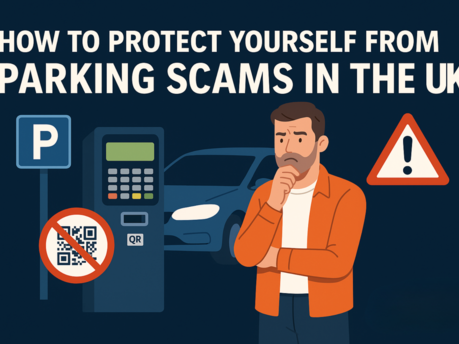How to Protect Yourself From Parking Scams in the UK
A Complete Guide for Essex Drivers and Motorists Across Britain
Paying for parking used to be a simple process, didn’t it? You’d find a space to park in, pop in some coins in the meter, and stick a ticket on your dashboard. These days, while the shift to digital payments and smartphone apps has made life easier in many ways, it's also opened the door for sophisticated scammers looking to steal your hard-earned money.
If you drive regularly in Essex or anywhere across the UK, you need to know how these fraudsters operate - and more importantly, how to protect yourself! With parking scams costing UK drivers nearly £3.5 million in the 12 months to April 2025, and incidents reported across Essex from Southend to Epping Forest, it's more important than ever to stay vigilant when paying to park.
We've put together this comprehensive guide all about how to protect yourself from parking scams in the UK to help you spot the warning signs, avoid common traps, and know exactly what to do if you become a target of a parking scam. Read on to find out more…
Key Takeaways:
- Parking scams have surged dramatically, with nearly 800 reports of QR code fraud costing victims £3.5 million in the year from April 2024 to 2025.
- QR code phishing (known as “Quishing) has already affected over 100 councils across the UK, including multiple Essex locations such as Southend, Epping Forest, and Uttlesford.
- Fake penalty charge notice (PCN) text messages are becoming increasingly sophisticated and convincing.
- Councils and local authorities will never send parking fines via text message - instead, genuine PCNs are physical tickets or postal letters.
- Simple precautions like downloading official parking apps and checking for tampered QR codes can save you from any potential financial loss.
- If you receive a suspicious parking-related message (this is called “Phishing”), forward it to 7726 and report it to Action Fraud on 0300 123 2040.
What Are Parking Scams and Why Are They on the Rise?
Parking scams are fraudulent schemes designed to trick you into paying fake fines or handing over your payment details when you're simply trying to pay for legitimate parking. These scams have exploded in recent years because more car parks and councils have moved away from cash payments and traditional pay-and-display machines towards app-based and contactless payment systems.
While this digital shift has made parking more convenient for most drivers, it has also created opportunities for criminals to exploit our trust in technology. According to the National Fraud & Cyber Crime Reporting Centre, Action Fraud, reports of QR code scams in the UK doubled between 2023 and 2024, with fraudsters becoming increasingly sophisticated in their tactics.
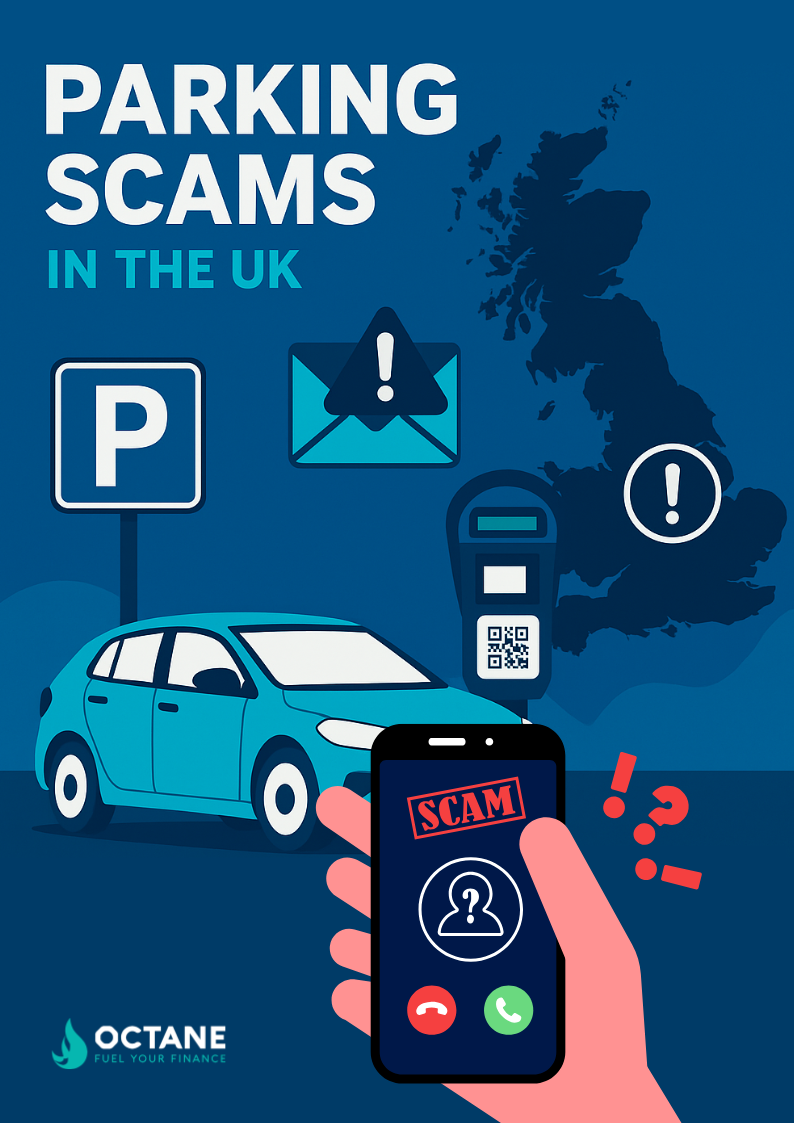
Parking Fraud in Our County of Essex - The Impact on a Local Level
Right here in our local county of Essex, multiple councils have been targeted by parking scammers. For example, in February 2025, Southend-on-Sea City Council issued urgent warnings after fraudsters placed fake QR code stickers on parking signs across the central seafront area. Epping Forest District Council and Uttlesford District Council have also warned residents about scam text messages claiming to be parking fines.
For those living and working in Essex, like us here at Octane Finance, what’s important to be aware of is that whether you're parking in Rayleigh, Wickford, Chelmsford, or along the coast in Southend, this isn't just a national problem. It's happening on our doorstep, in the car parks we use every day.
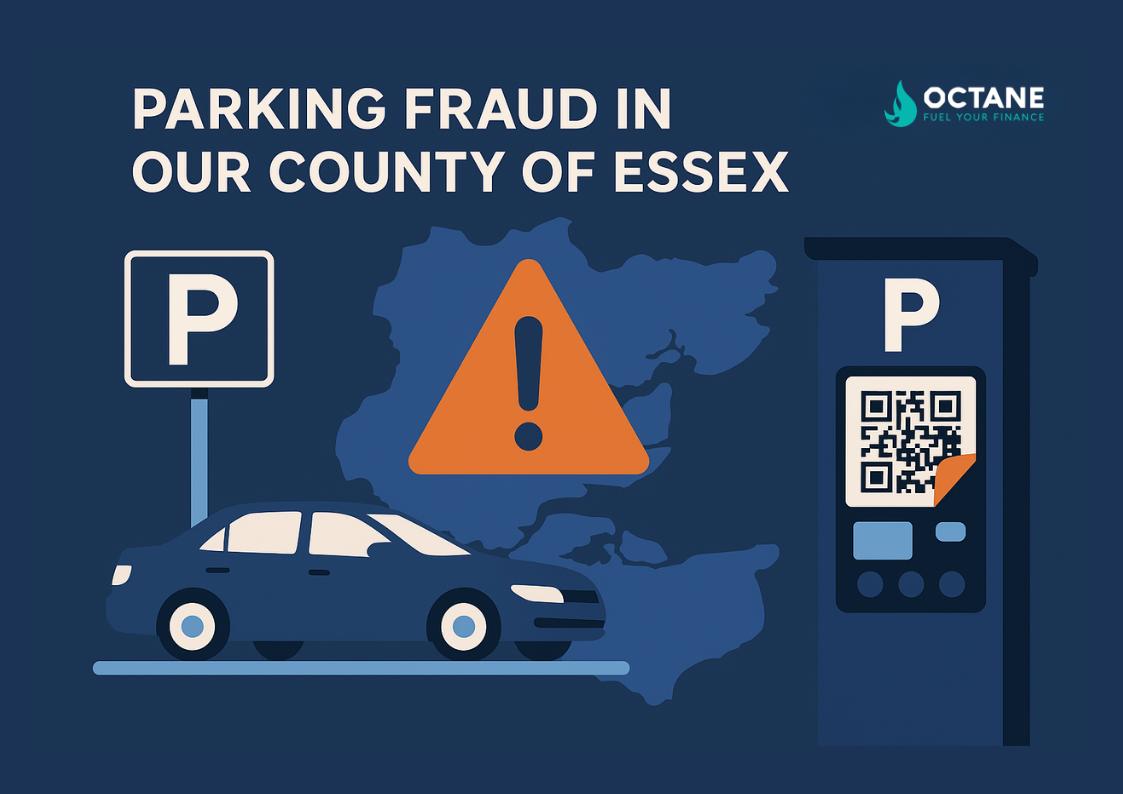
The Most Common Types of Parking Scams to Watch Out For in the UK
1. "Quishing" – The Fake QR Code Scam
Perhaps the most common scam affecting drivers right now involves fake QR codes that have been stuck over legitimate ones on parking machines and signage in car parks. When you scan these fraudulent codes, they redirect you to convincing copycat websites that steal your payment details.
In some cases, victims have reported losing over £300 through repeated unauthorised transactions. Even worse, you still haven't actually paid for parking, so you could end up with a genuine parking fine on top of losing money to the scammers.
2. Fake Penalty Charge Notice (PCN) Text Messages
This type of parking scam involves the driver receiving a text message claiming you have an outstanding parking fine that needs immediate payment. The message typically includes a link to a fake payment website and uses threatening language about "enforcement proceedings," "court action," or even "driving bans" to pressure you into paying quickly.
In reality, no legitimate UK council or parking authority will ever send you a parking fine via text message. Genuine PCNs are always issued as physical tickets placed on your windscreen or sent as letters to the registered keeper's address.
3. Fake Parking Attendants at Events
But it’s not just fake QR codes and text messages causing problems for drivers. In some cases, scammers target people attending busy events like football matches, concerts, or festivals. A person wearing a hi-vis jacket and looking official will direct you into a parking space and collect cash payment upfront.
When you return to your car after the event, you may find you've been ticketed for parking illegally, or worse, your vehicle has been towed away. The person you paid was never authorised to manage parking in that location, and your money is long gone. Our advice is to always verify parking arrangements before handing over cash.
4. Fake Parking Tickets Placed on Your Windscreen
In this type of parking scam, fraudsters use portable printers to create convincing-looking parking tickets and place them on your windscreen while you're away from your vehicle – even when you've parked perfectly legally. They'll direct you to pay online via a website or QR code, with some even including payment options like PayPal to make them seem more legitimate.
But when you visit the payment website, you're either installing malware on your device or handing over your payment details to criminals. Either way, the "parking fine" was never real, but the theft of your money or data certainly is.
5. Fake Parking Emails
Similar to the text message parking scam, fraudsters send emails claiming you have an unpaid parking ticket. These emails often look highly professional, complete with council logos and official formatting.
The emails typically include links to "view your violation," "see photographic evidence," or "pay your fine." Clicking these links could download malware onto your computer or take you to a fake payment portal designed to steal and store your financial information.
6. Card Skimming Devices
While less common than other types of parking scams, this one is particularly cunning! Fraudsters attach Bluetooth-enabled card skimmers or fake overlays to contactless card readers on parking payment machines.
These devices capture your card details when you tap or insert your card to pay for parking. The scammers then use this information to make unauthorised purchases or withdrawals from your account.
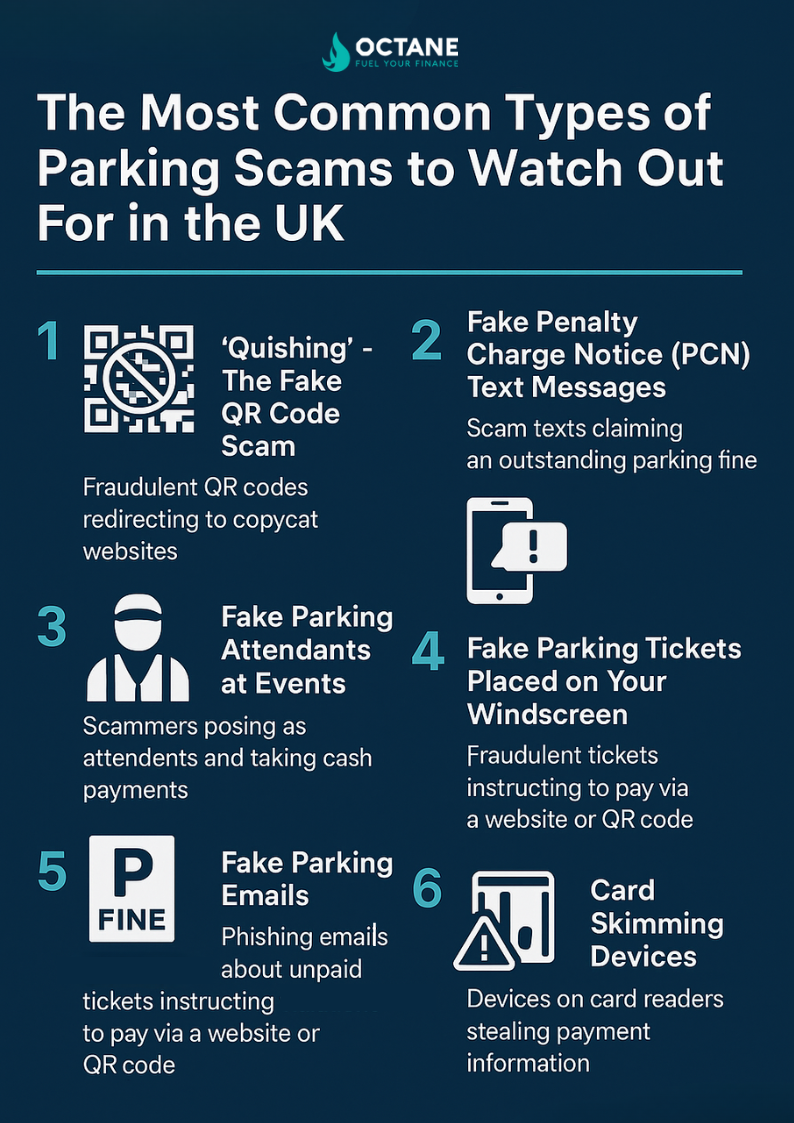
How to Spot a Parking Scam: The Warning Signs
Becoming a victim of a parking scam is easier than you might think, but there are some telltale signs to look out for that something isn't quite right. Here's what you need to know:
Text and Email Parking Scams Warning Signs:
- Unsolicited messages - You receive a text or email about a parking fine without having found a physical ticket on your car.
- Urgent threats - The message uses aggressive language about immediate legal action, arrest warrants, or driving bans.
- Suspicious links - URLs that are shortened, misspelt, or don't match official government websites (genuine sites should end in .gov.uk).
- Request for immediate payment - Pressure to pay right now, today, without time to verify.
- Unknown phone numbers - Messages from unrecognised numbers, especially international ones.
- Generic greetings - Not addressed to you by name. Real fines will include your vehicle registration and personal details.
- Poor grammar and spelling - Official communications are professionally written and proofread.
- Vague details - No specific information about where or when the alleged parking offence occurred.
QR Code Parking Scams Warning Signs:
- Stickers over original codes - The QR code looks like it might be a sticker placed over something else.
- Damaged or tampered signage - The area around the QR code shows signs of interference.
- HTTP instead of HTTPS - When you scan the code, the website URL doesn't include "https://" (the 's' means secure).
- Spelling mistakes on the website - Official parking payment sites are professionally designed with correct spelling.
- Unusual payment requests - Being asked for more information than necessary, or payment methods that seem odd,
In-Person Parking Scams Warning Signs:
- Cash-only payment - Legitimate parking attendants typically provide multiple payment options.
- No official signage - The area lacks proper parking signs or information.
- Vague answers - The "attendant" can't provide clear information about their employer or parking regulations.
- Pressure tactics - Being rushed to pay quickly without proper documentation.
- No receipt - Refusing or unable to provide an official receipt or parking ticket.
How to Protect Yourself When Parking: Practical Steps to Stay Safe
The good news is that with a bit of vigilance and some simple precautions, you can significantly reduce your risk of falling victim to parking scams. Here's what we recommend:
When Paying for Parking:
Download official apps in advance
Before you travel, download legitimate parking apps like PayByPhone, RingGo, or JustPark directly from your phone's official app store. This way, you won't need to scan QR codes or visit unfamiliar websites when you're in a hurry to park.
Never scan QR codes on parking machines
Given the amount of fake QR code stickers in car parks, it's best to avoid scanning them altogether. Instead, use parking apps, enter location codes manually, or pay with cash or card at the machine if available.
Inspect QR codes carefully
If you absolutely must scan a QR code, examine it closely first. Look for signs that it's a sticker placed over the original code, such as edges that are lifting, misalignment, or visible layers.
Check website URLs
Before entering any payment details online, verify that the website address starts with "https://" (not just "http://") and matches the official parking operator's website. A helpful tip is to look for the padlock symbol in your browser's address bar.
Keep receipts and parking tickets
Always obtain and keep proof of payment. Take a photo on your phone as backup documentation, just in case.
Trust your instincts
If something feels off – whether it's a payment machine, a "parking attendant," or a message about a fine – take a step back and verify before proceeding. Go with your gut!
What to do When You Receive Suspicious Communications:
Don't click links in unexpected messages
If you receive a text or email about a parking fine you weren't expecting, do not click any links. Instead, visit the council or parking operator's official website directly by typing the address into your browser.
Verify independently
Call the council or parking authority using contact details you find for yourself on their official website – not numbers provided in the suspicious message.
Check the details
Remember that legitimate parking fines will always include specific information. This might include your vehicle registration, the date and time of the alleged offence, the exact location, and how to appeal. If any of these details are missing or vague, it's likely a scam.
Remember the golden rule
UK councils and parking authorities NEVER send parking fines via text message. If you've received a text about a PCN, it's a scam.
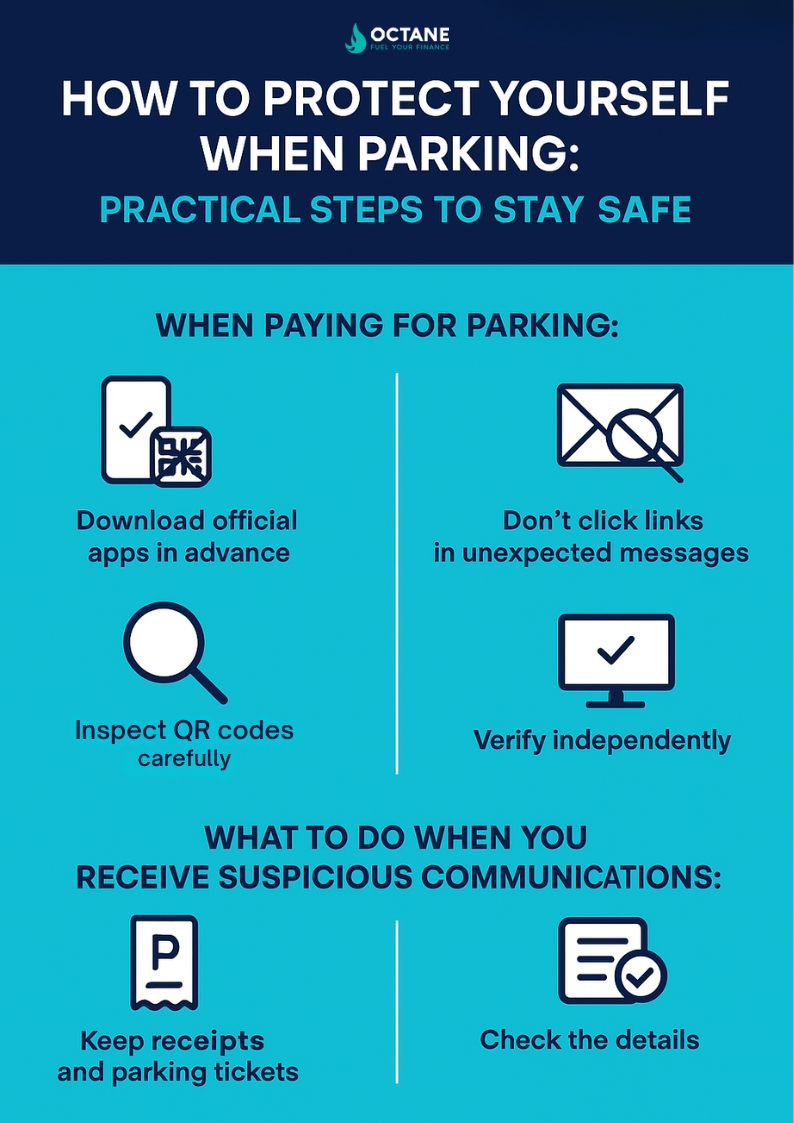
What to Do If You Think You've Been Scammed
Despite your best efforts, if you suspect you've fallen victim to a parking scam, acting quickly can help minimise the damage and potentially help others avoid the same fate. Here’s what we suggest:
Immediate Actions to Take:
Contact your bank immediately
If you've unexpectedly provided payment card details to scammers, call your bank's fraud department straight away. They can freeze your card, reverse transactions, and monitor your account for suspicious activity. Most banks have 24/7 fraud helplines for urgent situations.
Change your passwords
If you entered any passwords or personal information on a fake website, change them immediately – particularly for online banking and email accounts.
Monitor your accounts
Keep a close eye on your bank statements and credit card transactions for the next few months. Report any unauthorised transactions to your bank immediately.
How to Report the Scam:
Forward scam texts
Send suspicious text messages to 7726 (which spells SPAM on your keypad). This free service helps mobile networks identify and block scam numbers.
Report scams to Action Fraud
Contact Action Fraud, the UK's national reporting centre for fraud and cybercrime:
- Online: www.actionfraud.police.uk
- Phone: 0300 123 2040
Notify the relevant council or parking operator
If the scam involved a specific car park or location, inform the council or parking company so they can warn others and remove any fake QR codes or signage.
Report the scam to your local police
While they may direct you to Action Fraud, it's still worth making a local police report, especially if the scam occurred at a specific physical location in your area.
The National Parking Platform: Protecting Drivers
In recognition of the confusion caused by multiple parking apps and the opportunities this creates for scammers, the UK government has been rolling out the National Parking Platform (NPP). This initiative aims to simplify parking payments and reduce scam opportunities for fraudsters.
How the NPP Works:
Instead of requiring drivers to download a different app for each location, the NPP allows you to use your preferred parking app (from approved providers like RingGo, PayByPhone, or JustPark) at any participating car park.
The platform has already been rolled out in 10 local authorities, including Manchester, Liverpool, Peterborough, and Coventry, handling over half a million transactions monthly across 476 locations. While Essex isn't yet part of the initial rollout, the government plans to expand the system to more councils across the country - so watch this space!
Staying Safe While Staying Mobile
At Octane Finance, we're passionate about keeping Essex drivers safe on the road and helping drivers maintain the reliable transport they need. While we specialise in finding the best vehicle finance solutions for drivers across the UK, we also believe in looking after our community by sharing important information that affects your daily driving experience.
Do You Need Help With Car Finance?
Whether you're looking to upgrade your current vehicle or find flexible finance options that work for your circumstances, our experienced team at Octane Finance is here to help. We work with a comprehensive panel of trusted lenders to find solutions that fit your needs – from mainstream car finance to specialist options.
As Essex's leading automotive finance broker, we understand the unique needs of local drivers. Our team brings a personal touch to every application, taking the time to understand your situation and match you with the most suitable lenders.
Contact us today to explore your car finance options and take the next step towards your ideal vehicle – without the worry of parking scams along the way. In the meantime, stay safe, stay informed, and happy motoring!

